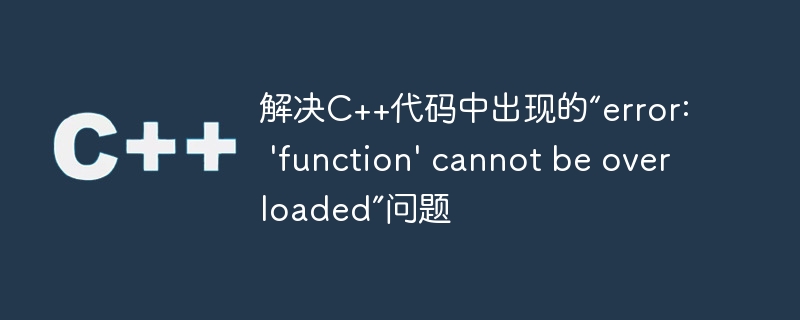

Solve the "error: 'function' cannot be overloaded" problem in C code
In C programming, when we define a function, sometimes it may You will encounter an error message similar to the following: "error: 'function' cannot be overloaded". This error means that we have multiple functions defined in the same scope with the same name but different parameters, and the C compiler cannot do function overloading based on the parameter list of the function.
Function overloading refers to defining multiple functions with the same name but with different parameter lists in the same scope to achieve more flexible function calls. However, since C requires distinction between function overloads, you must ensure when defining functions that different functions have different parameter types and/or number of parameters.
So, when we encounter the problem of "error: 'function' cannot be overloaded", how should we solve it? The solution will be introduced below through a practical code example.
Suppose we have the following C code:
#include <iostream>
void printMessage(int num)
{
std::cout << "Number: " << num << std::endl;
}
void printMessage(int num1, int num2)
{
std::cout << "Numbers: " << num1 << ", " << num2 << std::endl;
}
int main()
{
printMessage(10);
printMessage(20, 30);
return 0;
}The above code uses the concept of function overloading and defines two functions with the same name printMessage, each receiving an integer parameter and two integer parameters. However, when we try to compile the above code, we get the following error message:
error: 'printMessage' cannot be overloaded
void printMessage(int num)
^
error: with 'void printMessage(int, int)'
void printMessage(int num1, int num2)This is because the compiler cannot distinguish based on the number and type of parameters provided when the function is called, resulting in a conflict.
In order to solve this problem, we can use the following two methods:
Method 1: Modify the function name
The simplest solution is to modify The name of one of the functions to avoid function name conflicts. In the above example, we can rename the printMessage function to printSingleMessage, and the modified code is as follows:
#include <iostream>
void printSingleMessage(int num)
{
std::cout << "Number: " << num << std::endl;
}
void printMessage(int num1, int num2)
{
std::cout << "Numbers: " << num1 << ", " << num2 << std::endl;
}
int main()
{
printSingleMessage(10);
printMessage(20, 30);
return 0;
}By modifying the function name, we successfully solved the problem Problems caused by overloading.
Method 2: Use default parameters
Another solution is to use the default parameters of the function. Default parameters provide a default value for the parameter in the function declaration. If no parameter value is provided when the function is called, the default value is used. In the above example, we can set the second parameter as a default parameter, the code is as follows:
#include <iostream>
void printMessage(int num)
{
std::cout << "Number: " << num << std::endl;
}
void printMessage(int num1, int num2 = 0)
{
std::cout << "Numbers: " << num1 << ", " << num2 << std::endl;
}
int main()
{
printMessage(10);
printMessage(20, 30);
return 0;
}By setting a default value for the second parameter, we implement the overloading of the function, and do not The error message "error: 'function' cannot be overloaded" will appear again.
To sum up, when we encounter the problem of "error: 'function' cannot be overloaded" in C code, we can solve it by modifying the function name or using default parameters. These methods can help us deal with problems caused by function overloading and ensure that the code compiles and runs successfully.
The above is the detailed content of Solve the problem of 'error: 'function' cannot be overloaded' in C++ code. For more information, please follow other related articles on the PHP Chinese website!
 How to solve scripterror
How to solve scripterror
 How to solve 500error
How to solve 500error
 Introduction to the usage of vbs whole code
Introduction to the usage of vbs whole code
 What are the differences between c++ and c language
What are the differences between c++ and c language
 Recommended learning order for c++ and python
Recommended learning order for c++ and python
 Cost-effectiveness analysis of learning python and c++
Cost-effectiveness analysis of learning python and c++
 Is c language the same as c++?
Is c language the same as c++?
 Which is better to learn first, c language or c++?
Which is better to learn first, c language or c++?




